
The Riyadh Masters 2024 group stage is coming to an end: Why it's time for Dota 2 to abandon Round Robin
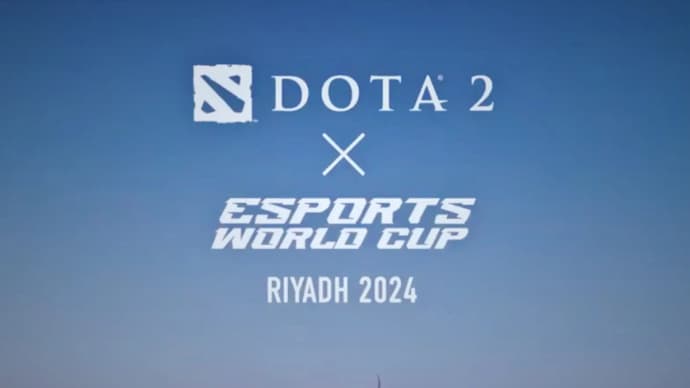
The Riyadh Masters 2024 group stage, which was preceded by the Play-In stage, ends today. The teams have already played a huge number of matches with the goal of getting into the playoffs of potentially the largest Dota 2 tournament of the year and competing for the main prize of $1,500,000. In this regard, the question arises of the appropriateness of the current format for holding the largest championships in the MOBA discipline from Valve, namely the use of Round Robin in the group stages.
Round Robin groups with little influence
It's 43 degrees Celsius in sunny Riyadh as OG are playing out their final bo2 series against LGD Gaming in the group stage of Riyadh Masters 2024. This is the seventh match in the last five days for the two-time world champions in Group A. Eight teams are playing in parallel for a large number of matches only to weed out the two weakest participants and send two more teams to the lower part of the playoff bracket.
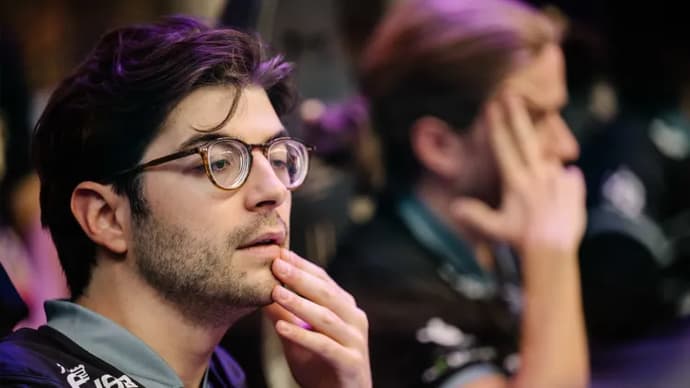
If we look at the Play-In stage, the situation there looks even more absurd. After all, out of two groups of six participants, only two teams will immediately leave the tournament. Thus, the teams, which on their way to the playoffs went through the Play-In, the decider match, and the group stage, played an insane 13 matches. The low level of influence of such matches directly affects their tournament interest from both spectators and the teams themselves.
Some will say that such a drawn-out format allows teams to acclimatize, get used to the current meta and play out. For example, Entity successfully passed the Play-In and also performed well in Group B of the group stage. But this approach also has a downside.
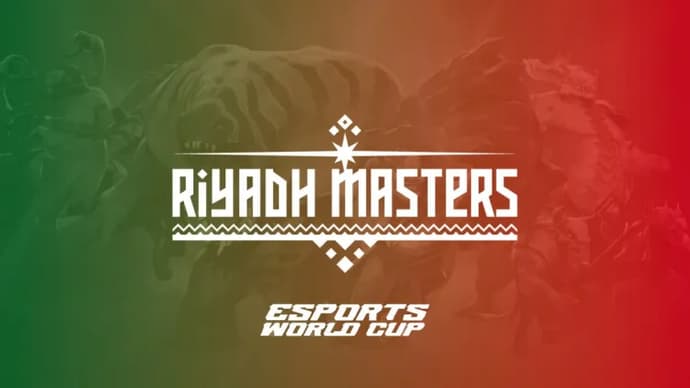
The problem of long game days with parallel matches
Let's start with the obvious disadvantage of this group format. The average viewer or even an avid esports fan physically cannot watch three or four matches at the same time, and given that there can be 10-12 such matches a day, the public’s interest is eroded. As a result, on one game day there are only a few truly noteworthy clashes left, which attract the entire audience.
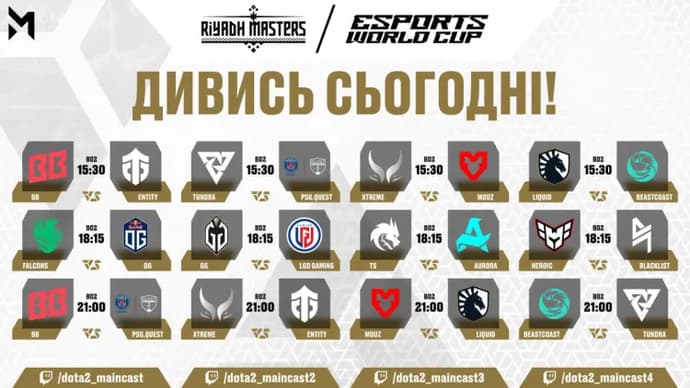
In addition to the dilution of interest on the part of spectators, it is worth noting the fact that the broadcast studio staff are also burning out in the group stages of the Round Robin format. It is not uncommon to see how tired commentators and analysts are by the last stream of matches of the match day. Obviously, it is extremely difficult to comment and analyze such a huge number of matches. Also, do not forget about players who also burn out and sometimes may not have time to properly prepare for their opponent or may simply get tired.
So what is the ultimate beneficiary of Dota 2's current group stage system? Everything is quite simple and obvious — these are the organizers and sponsors. The more hours of broadcasting you can do, the more ad integrations you'll be able to show. Although this does not apply to Riyadh Masters 2024 due to the specifics of the host country (gambling is prohibited in Saudi Arabia), bookmakers, who often act as title sponsors of both tournaments and teams, have a separate interest in such a number of matches.
What alternatives are there?
One of the obvious alternatives to Round Robin, which is already used in Dota 2, is the Swiss Format of the group stage. An example of implementation this year was Elite League Season 1, where a similar system made it possible to weed out the eight weakest teams. The principle of the Swiss format is quite simple. To advance further, a team needs to win three victories, and if the team loses three matches, it leaves the tournament. Accordingly, a tournament participant can advance to the next stage of the competition in three matches, or by stretching his performance to five matches in case of two failures.
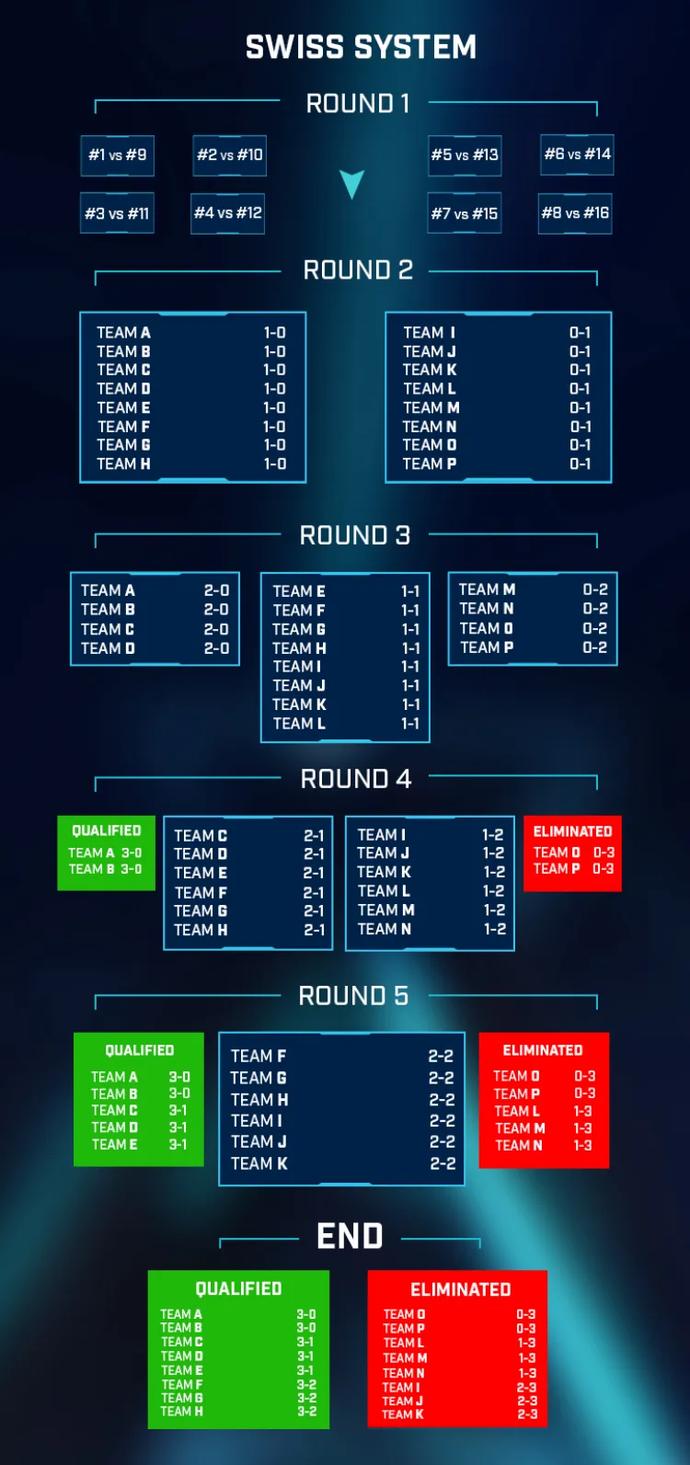
If we look at competitors in the esports market, then using Counter-Strike as an example, we can consider GSL-format groups. In essence, such a group is a Double-Elimination bracket, where in order to advance further, a team needs to achieve two victories, and in case of two defeats, the team leaves the group.
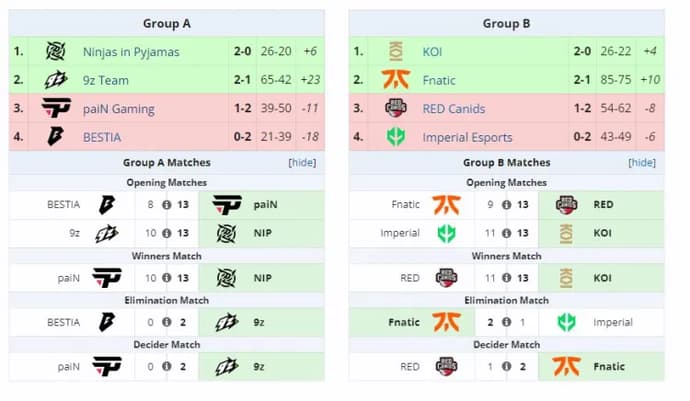
Let's try to compare the number of matches that were played in the group stage of Riyadh Masters 2024 and how many matches would have happened if the groups played in the GSL format. Excluding possible tiebreakers, 56 matches were scheduled for the group stage of the tournament in Saudi Arabia. If we apply the GSL format to this number of teams, we will have four groups of four teams. If you keep in mind the fact that from each group one team will leave the tournament, one team will go to the lower part of the playoff bracket, and two participants will advance to the winners’ bracket, then this results in five matches per group. That is, only 20 matches for the group stage.
Number of matches using different group stage formats with 16 participants:
- Round Robin — 56 matches
- Swiss — 33 matches
- GSL — 20 matches
And if we take into account the fact that the group stage lasts more than a couple of days, then it turns out to be quite comfortable for the spectators, the broadcast studios, and the players themselves. Although, of course, this may affect the attractiveness of tournaments for sponsors, but using the example of CS2, we can say that this does not prevent the organizers from having global car manufacturers, the same representatives of the gambling market, and even the American army on the list of sponsors.
Conclusion
The use of Round Robin in its current form in the group stages of major tournaments makes following and operating the tournament difficult. At the same time, there are alternative formats, Swiss and GSL, which allow you to optimize the number of group stage matches. However, you should not completely abandon Round Robin, since it is perfectly applicable to various leagues that do not use playoffs.

Maksym har jobbet hos EGamersWorld siden 2017. Han begynte i selskapet i løpet av det første året på universitetet og jobbet som oversetter frem til 2022. Etter det begynte Maksym å jobbe som redaktør. Hoveddisiplinen hans er Dota 2, og med tiden ble Maksyms ansvar utvidet til å omfatte CS:GO, CS2 og Valorant. I tillegg publiserer han som redaktør diverse materiale om spilltemaer.
 Passion UA inngår partnerskap med LORGAR for å styrke spillernes prestasjoner og supporternes opplevelsePassion UA kunngjør LORGAR som sin offisielle tekniske partner, og leverer Ready-to-Play-løsninger, fan-gaver og et fullt drevet laghusøkosystem.
Passion UA inngår partnerskap med LORGAR for å styrke spillernes prestasjoner og supporternes opplevelsePassion UA kunngjør LORGAR som sin offisielle tekniske partner, og leverer Ready-to-Play-løsninger, fan-gaver og et fullt drevet laghusøkosystem. Roblox Meta Lock Koder mars 2026Få de beste Roblox Meta Lock-kodene og øk spillet ditt.
Roblox Meta Lock Koder mars 2026Få de beste Roblox Meta Lock-kodene og øk spillet ditt.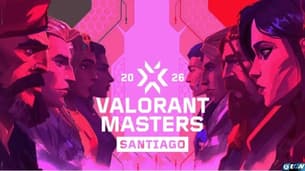 Oversikt over VALORANT Masters Santiago 2026VALORANT Masters Santiago 2026-guide: lag, datoer, format og premiepott på 1 million dollar.
Oversikt over VALORANT Masters Santiago 2026VALORANT Masters Santiago 2026-guide: lag, datoer, format og premiepott på 1 million dollar.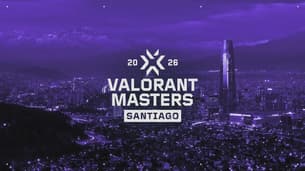 VALORANT Masters Santiago 2026: Komplett lagnivåliste og Pick’Em-guideVALORANT Masters Santiago 2026 er nesten her. Vi deler opp hele nivålisten, forklarer hvert lags sjanser og deler Pick’Em-spådommer for å hjelpe deg å forstå hvem som er favorittene.
VALORANT Masters Santiago 2026: Komplett lagnivåliste og Pick’Em-guideVALORANT Masters Santiago 2026 er nesten her. Vi deler opp hele nivålisten, forklarer hvert lags sjanser og deler Pick’Em-spådommer for å hjelpe deg å forstå hvem som er favorittene.





